Data integration is an essential component of data engineering. It relates to the use of technological tools to acquire data from various sources and consolidate them for analysis and reporting.
One such tool is the Google Cloud Platform (GCP) marketplace. But what is GCP Marketplace? GCP Marketplace is a cloud computing suite released by Google in mid-2018 to provide digital services.
Data integration through GCP Marketplace can be significantly enhanced using the GCP Marketplace API, which allows automated deployment and management of solutions.
Table of Contents
Understanding GCP Marketplace Analytics Capabilities
One of GCP’s key strengths is data analysis and related capabilities. Explore a library of pre-built and third-party solutions that have been categorized for different use cases, such as security, machine learning, and data analytics. Here are some features of GCP Marketplace that make it a valuable ally for data practitioners:
- Deployment: Using an intuitive interface, deploy solutions in a matter of clicks, frequently eliminating laborious setup procedures.
- Management: From a single location, oversee deployments, view billing data, and get updates for all marketplace solutions.
- Security: Use Google’s marketplace solution vetting procedure to help guarantee a minimum degree of security and dependability.
- Adaptation: GCP’s main focus is problem-solving, irrespective of infrastructure.
- Diversity: From all-purpose data tools to industry-specific solutions, discover a vast array of options meeting various needs.
- Integration: With GCP Marketplace Integration, seamlessly integrate partner solutions for enhanced cloud data analysis portability and streamlined workflows, optimizing data flow.
- Analytics: Leverage Elasticsearch through the GCP Marketplace for advanced search and data analytics. This distributed, RESTful search and analytics engine streamlines the processing and analysis of large datasets, addressing a wide range of use cases with efficiency and scalability.
In every stage of data analysis and management, GCP provides services a data practitioner can select from.
GCP Marketplace data analytical and visualization tools work by connecting to the cloud and manipulating and transforming data in real-time. They can be managed remotely and used to process both structured and unstructured data, either in batches or in regular streams.
Benefits of GCP Data Marketplace for Data Practitioners
From robust industries like eCommerce, banking, and finance to healthcare and even small to medium-sized enterprises, GCP Marketplace is ideal for data handling. GCP Marketplace for the data practitioner will provide:
High Productivity and Efficiency
GCP Marketplace offers a wide range of pre-built and state-of-the-art software from leading technology providers without compromising on security and compatibility. Data practitioners don’t need to spend hours trying to find the right tool— browse the marketplace by category, including data analytics, to understand the variety of solutions offered.
These solutions can address specific needs, like data integration, ETL (Extract, Transform, Load) processes, data quality management, and data visualization. GCP Marketplace also empowers data practitioners with a quick turnaround time on data analysis.
For instance, GCP offers services like Cloud SQL, BigQuery, and Cloud Storage as data sources. Pre-built integrations for these using a Google partner data pipeline platform like Hevo eliminate the need for manual setup and configuration for data transfer. Hevo is the only real-time ELT No-code Data Pipeline platform that cost-effectively automates data pipelines that are flexible to your needs. With integration with 150+ Data Sources (40+ free sources), we help you not only export data from sources & load data to the destinations but also transform & enrich your data, & make it analysis-ready.
All in all, data practitioners can save enormous time and effort by using pre-built solutions instead of building everything from scratch.


Simple Deployment and Management
It is no secret that traditional data workflows involve complex manual processes and maintenance practices. GCP has solutions for automated installation processes that are fast—eliminating the need to perform manual tasks. A lot of these solutions also have many minimal configuration requirements. Moreover, intuitive user interfaces can guide data practitioners through the configuration process, minimizing the risk of errors.
Management tasks like software updates, security patching, and resource scaling can be automated, which means that data practitioners get more time to focus on core data analysis functions.
Global Reach
Google is a global platform, and its services are nonetheless. GCP Marketplace boasts a complex network of data centers that enable data access from anywhere around the globe. For data engineers handling remote operations or outsourced tasks, this is a plus. In addition, a global reach means it’s easier to comply with legal or operations regulations from a particular locality.
Community Assistance
GCP Marketplace boasts an active community of seasoned data engineers and analytics who provide hands-on assistance on technical issues. This community is an invaluable asset for data engineers and businesses using Google Cloud services, where they can hire and even collaborate on projects with data handlers and experts. The community can also provide insights into the latest trends and GCP best practices.
High Performance and Scalability
Google Cloud’s scalability is unfathomable. Moreover, thanks to its robust infrastructure, the data services offered are designed for high performance. Data engineers can easily manipulate large chunks of data and perform complex computing tasks.
Integration Capabilities
Solutions created for easier GCP deployment frequently interact with other GCP services in a seamless manner. Because of this, data practitioners can create workflows that quickly and easily link various tools and data sources without having to worry about intricate integrations.
Integrations between GCP services allow for this type of smooth data flow without complex configurations or custom coding. Data tools and platforms work seamlessly with Google Cloud Platform’s vast ecosystem of services, streamlining your workflow.
For instance, if you’re building a workflow to analyze the marketing campaign data stored in GCS, using BigQuery along with Hevo simplifies your workflow. Hevo provides a ready-made Cloud Storage integration. Hevo is simple to connect to a data practitioner’s GCS bucket that holds marketing campaign data. Hevo handles the data extraction process automatically and on a predetermined schedule.
Data Security and Compliance
Not only are GCP Marketplace data centers highly secure, but Google also adheres to strict data security standards. Moreover, Google, as a global service provision platform, is compliant with regulations and standards, including CCPA, HIPAA, and GDPR. As a data engineer, this feature is essential in promoting professional ethics.
Ease of Use
GCP Marketplace data services are easy to use thanks to the library of documentation and tutorials available for newbies and veterans alike. Google also has customer service ready to provide technical assistance if need be.
Cost-effective
Google Cloud Platform is a cost-effective solution for data services. Several pricing options are available to meet the needs of different organizations. In addition, there are discount offers for select consumers depending on data volumes.
Constant Innovation
GCP data management services are constantly evolving, with new features and services being added. Google is always innovating ways to stay ahead of the data technology curve and help data engineers stay afloat with organizational data requirements.
Technical Support
Technical support for data marketplace and services is essential for any organization. Google has 24/7 online support for technical issues regarding their platform services. Moreover, Google provides technical training and certifications for acquiring skills in basic and advanced data management services.
GCP Marketplace Pricing Models
GCP provides users with pricing models to select the best option relative to their needs. Each of the models shares their pros and cons. Careful consideration has to be taken to ensure a cost-effective decision is made.
- Free: The Google Cloud free program grants users limited cloud billing credits valid for 90 days. Data practitioners can use this opportunity to explore and test the Google Cloud Platform. You only pay for the Google Cloud resources used, such as VM.
- Paid: When free credits run out, GCP workloads are provided under subscription models with no up-front fees and termination charges. The price of each model depends on the product and its usage.
- Subscription-based: In a subscription-based model, your customers will pay a fixed monthly or yearly fee for your software usage, regardless of the extent of use. You have the flexibility to modify the subscription plans, enabling your customers to upgrade or extend their subscriptions.
- Usage-based: A pay-as-you-go pricing model where you charge your customers based on your product’s metrics.
- Hybrid: In the hybrid pricing model, your customers pay a base subscription fee for using your software. In addition, additional charges are included based on their usage.
Getting Started with GCP Marketplace
To create a GCP account, you need two things:
- A valid Gmail ID, the main component for using any Google services
- A credit card for your billing information and a registered phone number
These two will guarantee seamless account set-up and subsequent use and premium upgrading if you so wish. Follow the steps below to get started with GCP Marketplace:
Step 1: Navigate to the GCP Account Home Page
Step 2: In the top-right corner, click on the ‘Start Free’ button. A popup requesting you to sign in will appear. Enter your Gmail ID.
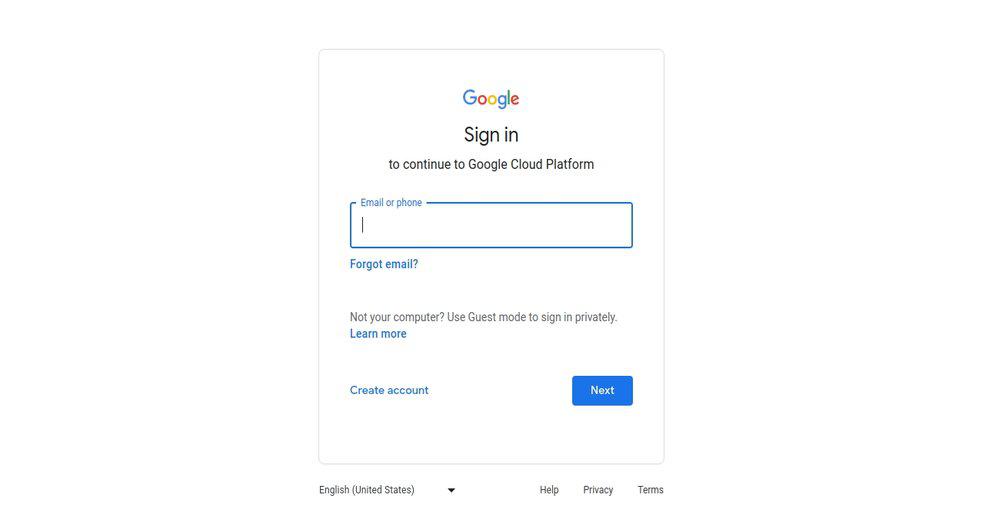
Step 3: Once you’ve signed in, you’ll be redirected to the GCP Free Trial page. Fill in the details requested, such as country and organization description. Then, remember to check the ‘Accept the terms of service’ box and proceed to continue.
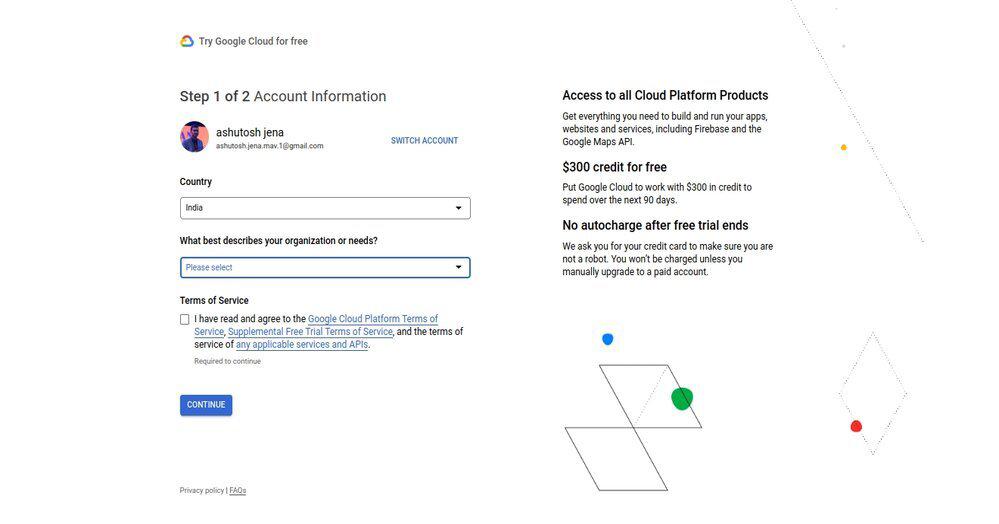
Step 4: Enter your business name and payment method, followed by your credit card information.
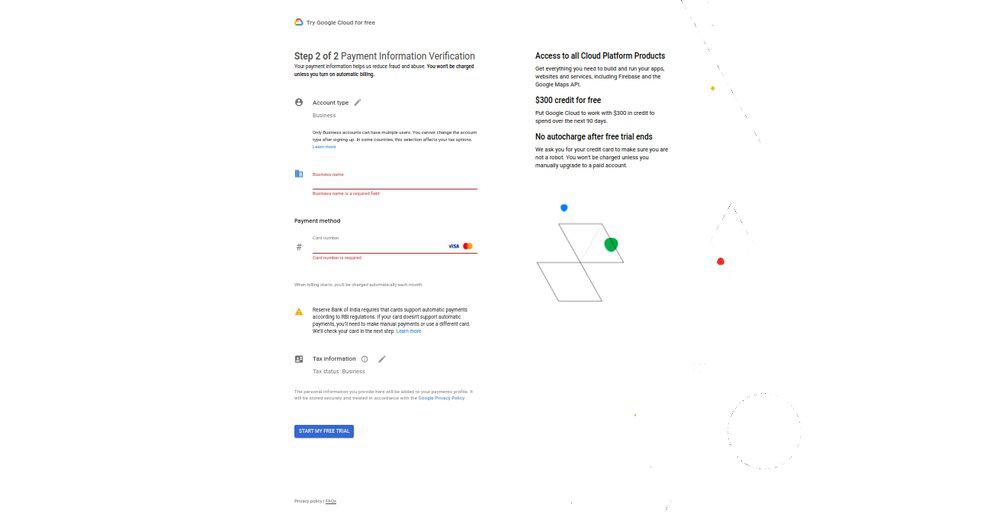
Step 5: Select the ‘Start my Free Trial’ button.
Step 6: Once you complete the payment, your free trial will start. In case you are wondering, Google will refund your money in 3 business days.
Step 7: You will be redirected to the Google cloud console.
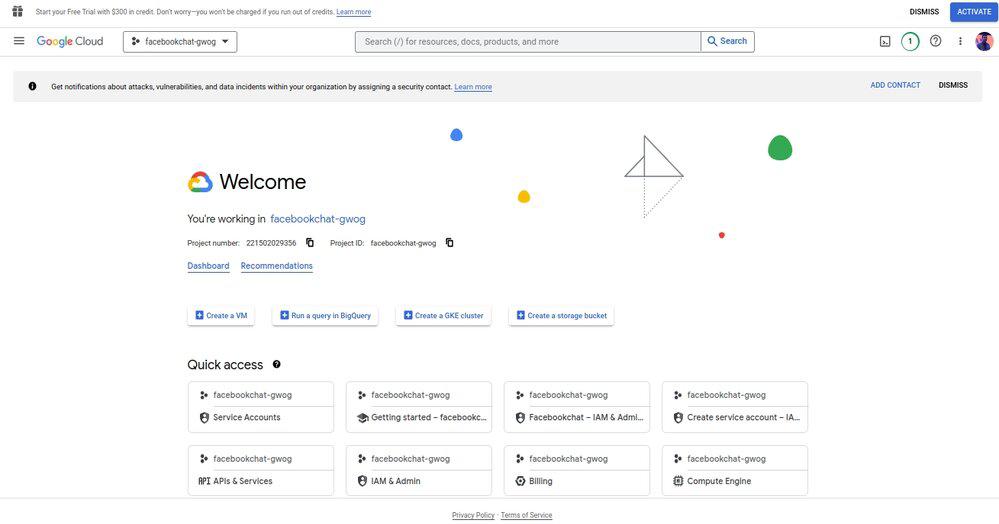
How to Get Listed in the GCP Marketplace?
GCP Marketplace product listings enhance visibility, promote credibility, and ensure global reach. They also make transactions easier and provide valuable customer metrics, which can be used to foster customer loyalty and drive business growth.
GCP requires a seller to provide details about their listing before marketplace publishing. There are three parts to complete:
- Product Details: Add info about your product
- Pricing: Specify your pricing model
- Technical Integration: Submit technical integration details for the product
How to Buy from GCP?
To purchase an offering, you’ll need your GCP Marketplace account with the billing administrator role selected.
- Log in to your Google Cloud console.
- Contact the seller and request a quote for the listing. You’ll receive a private quote link. Click on it to review the agreement terms.
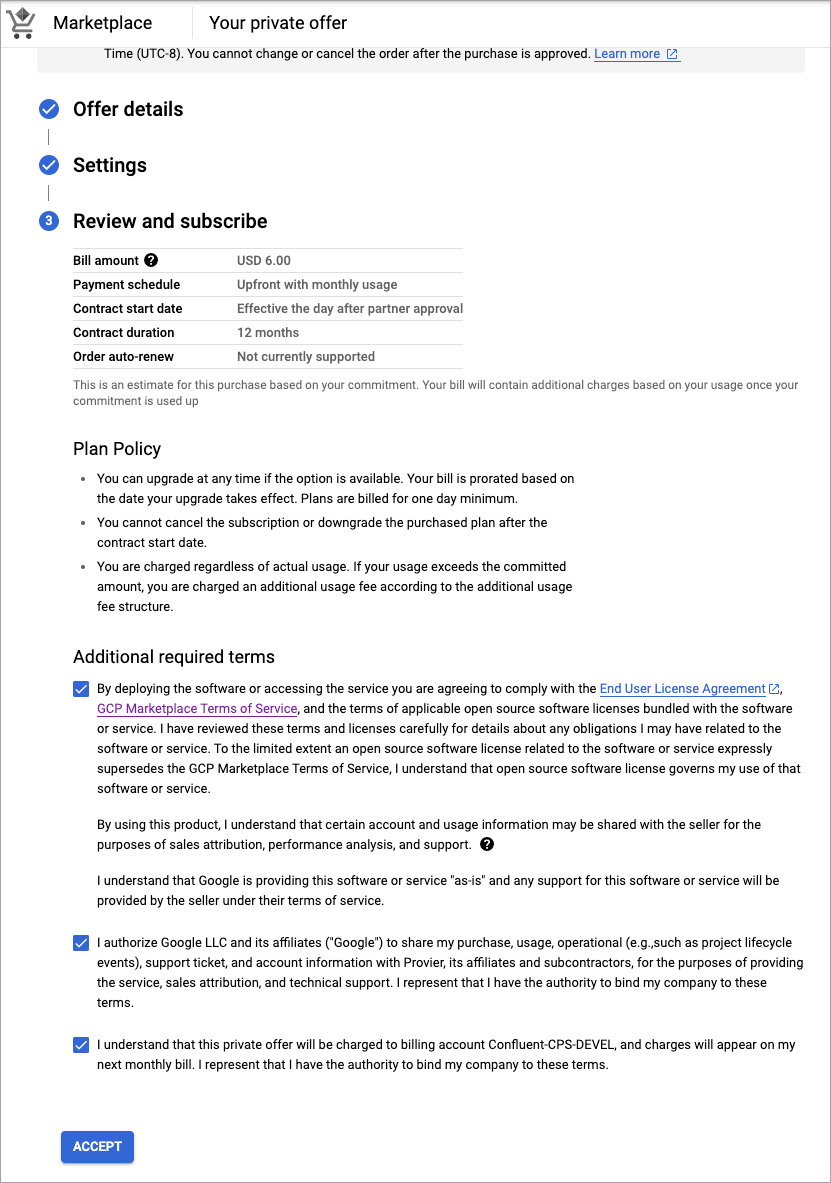
- Click ‘Accept’ to subscribe to the listing.
- Navigate to the products page to get started with your purchased product.
Utilizing Data from GCP Marketplace
Once you’ve chosen the right tools, it is time to put these solutions on GCP Marketplace into action. And the process of implementing data into your projects is seamless as well.
Searching for Relevant Data Sets
If you wish to obtain relevant data sets from the cloud library, follow the steps given below.
Step 1: Search the organization you wish to access on your console and click on the view dataset. For instance, the data on World Bank World Development Indicators Data
Step 2: Copy the Dataset ID into the search field located at the top left corner of the webpage
Step 3: Remember to broaden the search to get more relevant data sets
Step 4: Star the specific table(s) you wish to access
Implementing Data into Projects
To manipulate data in GCP, you’ll need to create a project and then access the various tools available.
Step 1: Login to GCP
Creating a GCP project is not that difficult. You’ll first need to log in to your Google Cloud console. If you don’t have one, the steps to create one are outlined above. Once logged in, proceed to the Console’s homepage.
Step 2: Select a Project
Navigate to the top left corner, adjacent to the Google Cloud logo, and click on ‘Select a Project.’

Click on ‘NEW PROJECT’ to create a new project.
Step 3: Fill Details
A new page will pop up requesting input for the project details, the ‘project name’ and ‘location.’ The project name will also be your project ID and cannot be edited once set.
Once done, click on ‘Create’.
Step 4: Access your Project
After a few seconds, your project will be created, and you can access it by clicking on it, which will redirect you to the GCP console homepage. You can then start accessing the services you want.
Understanding GCP Marketplace Data Usage Policies
Here are some Google data usage policies you need to keep in mind:
- GCP Marketplace restricts third-party access to the marketplace interface and data, protecting user information. The platform safeguards users from fraudulent and deceptive activities.
- GCP Marketplace doesn’t use bots or intentionally release computer viruses, worms, trojan horses, and corrupted files.
- Google Cloud reserves the right to terminate any user found acting in a manner that harms fellow users or attempts to illegally and/or forcefully acquire personal data.
Best Practices for Data Engineers
Data engineers can build robust, scalable, and efficient data pipelines by incorporating these best practices:
Ensuring Data Compliance and Security
Data engineers need to apply data quality and security measures to ensure their validity. Ensuring data compliance and security protects data from attacks and unauthorized personnel. Through GCP Marketplace, data engineers can use the available tools to validate and encrypt data.
Optimizing Data Usage for Performance
Optimizing GCP data usage helps reduce costs and improve cloud computing performance. Data engineers ought to use the right tools to leverage automation and optimize network infrastructure to boost performance.
Integrating GCP Data with Existing Workflows
Data practitioners using GCP Marketplace can significantly increase their efficiency, productivity, and overall data analysis capabilities by integrating GCP data with their current workflows. They can ensure that their data complies with security and governance best practices, streamline workflows, and concentrate on strategic tasks.
How to Integrate GCP Data with Existing Workflows?
Data practitioners can also integrate GCP data with existing workflows. To do so, follow the steps outlined.
- Step 1: Navigate to the ‘Application Integration’ page from the Google Cloud console
- Step 2: Click on ‘Integrations’. The page will list all other integrations available if present.
- Step 3: Select the existing integration you wish for the existing workflow. It’ll open in the integration editor.
- Step 4: Click ‘Tasks’ on the integration editor navigation bar to list available tasks.
- Step 5: To view the ‘Workflows—Execute’ task configuration pane, click and drag the ‘Workflows—Execute’ element into place. Then, click on it again.
- Step 6: Navigate to ‘Authentication’ and pick the profile that you are currently using.
GCP console saves the input fields automatically.
Real-World GCP Application: Case Studies
GCP is used extensively in virtually all industries. Let’s have a look at two case studies.
- Philips: Philips, a global healthcare technology company, leverages GCP’s BigQuery and Dataflow to store large data volumes, and process it, respectively across various healthcare solutions. They employ GCP to improve patient service delivery, optimize resource allocation to their various branches, and enhance efficient operations across their satellite branches.
- Zulily: Zulily, an eCommerce platform, uses GCP for real-time data integration and ETL. They employ GCP’s Dataflow tool to consolidate data from diverse sources to analyze customer behavior in real-time. As a result, they can provide personalized marketing campaigns, optimize their inventory and boost sales.
In Summary
GCP Marketplace’s flexibility and tools provided meet the dynamic of data robust industries as aforementioned. Moreover, the data analytics services drive decision-making skills to the edge not forgetting safeguarding data, the most precious asset in the business world today.
With Machine Learning and AI integration, data engineers can expect a bright future in cloud computing. However, they will need to keep up with the trends by learning and incorporating these upcoming skills. Also, more regulations are being implemented to safeguard data and deal with data crimes, and therefore, they will need to become familiar with the legal frameworks surrounding data handling.
Hevo cloud solutions management, together with GCP Marketplace, ensures effective and transparent data privacy policies and security measures. Our extensive experience in cloud computing and data management is an asset that shouldn’t be overlooked.
Want to take Hevo for a spin? Sign Up for a 14-day free trial and experience the feature-rich Hevo suite firsthand.
Frequently Asked Questions
1. Can I package solutions built on GCP Marketplace?
Yes. In GCP Marketplace, visit the listing page for the product that you wish to deploy. From this page, you can review details of the product and its pricing information.
2. Does GCP have a License Management Service?
No, GCP doesn’t currently offer a dedicated License Management Service.
Google Cloud supports bringing your own licenses (BYOL) that have dedicated hardware requirements to Compute Engine.
3. Does GCP Marketplace support third-party log explorers?
Yes, GCP Marketplace supports third-party log explorers. Load all the Logs into Elastic Cloud, and it will provide a view into all your GCP logs.

